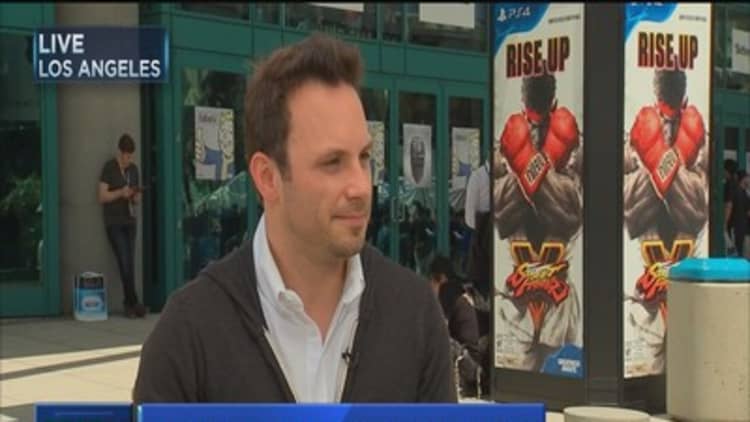Virtual reality is about to move out of the world of test labs and selected previews, and become a fully fledged retail product like any other gaming platform.
In the next six months, Facebook-owned Oculus and Samsung are expected to release the Gear VR, an Oculus-made virtual reality headset for Samsung phones, while HTC and Valve say their Vive VR system will also be on the market. And by the first half of 2016, Sony's Project Morpheus for the PlayStation 4 will have its final name and be on shelves, as will Oculus' Rift headset for PCs.
And while these initial releases will be aimed at early adopters—people who aren't afraid to spend more, and are often tastemakers—companies expect to sell many millions of units within a few short years.
And videogame developers are getting ready for that surge in interest.
Read MoreNow YOU can invest in virtual reality start-ups
"As we create worlds, it gives us a chance to explore them totally differently, with an interface that is unique," says Yves Guillemot, CEO of Ubisoft, which showed off a number of VR demos at this year's E3. "I think adoption will be a little like consoles—not this last generation, but the one before. We'll see 2 or 3 [million headsets sold] in the first couple of years, then 5-10 million per year."
Ubisoft is one of the largest independent game publishers that has fully voiced its support for the medium, but smaller studios—including Guerrilla Games (makers of the "Killzone" series) and 505 Games—are also looking to claim early footholds.
Other large, publicly traded studios, though, are still taking a more conservative approach.
"I'm open minded and potentially excited," says Strauss Zelnick, CEO of Take-Two Interactive Software. " I think the same questions remain: How long will people want a vision-occluding device on their head? What does it mean for your interactions with other people? How will I feel? Will there be any discomfort? How long an experience will it be? ... [But] we're doing plenty of R&D; we expect to be in the market if the market develops."
Read More
One of the biggest expected hurdles facing VR is pricing. Early, limited release versions of Gear VR have required Samsung's top-of-the-line phones. And the minimum PC specs for Oculus Rift are high, requiring people to spend heavily on their PC. HTC and Valve haven't given any hints yet, nor has Sony, though the maker of the PS4 is hoping to lure in a larger audience at a faster pace than some of its VR competitors.

"Our goal is always to try to build an affordable product," says Andrew House, president and group CEO of Sony Computer Entertainment. "I view it in the same sense as I view a hardware platform launch. You've got to hit that right balance between people getting value for money but at a price that's sensible for the company. We're not going back to the days of PlayStation 3 where the company is losing an enormous amount of money on the hardware proposition alone. ... The best analogy I can give is the PlayStation 4 pricing. We [knew] pretty early on we knew where we wanted to be."
(Guillemot says he believes people will pay $300 or $400 for a headset without too many complaints.)
Read MoreVirtual reality gets real at E3: Here's what to watch
House knows the hurdle the technology faces, though. Up until a few weeks ago, even he was a bit skeptical—and his company is a significant player in the market.
"It is something that has come home to me personally in the last couple of weeks as we sat in Tokyo and tried out demos for Morpheus," he says. "The immersiveness of VR suddenly means the simplest game concepts are transformed into something new and exiting."
That's part of the problem with VR. To really "get" it, you have to experience it. Explanations, no matter how detailed or flattering, can't really describe what virtual reality is like, nor can 2D video demonstrations . That's why the technology is so dependent on the early adopters, as manufacturers and publishers hope they show off the technology to friends, who in turn go out and buy one at some point.
Read MoreVirtual reality is helping stroke patients to walk
Of course, not every publisher is leaning in to VR at the moment.
"The current types of virtual reality aren't really a good fit for Nintendo's philosophy of trying to create entertainment that people can play together in the living room," says Shigeru Miyamoto, creator of Mario and the majority of Nintendo's stable of characters. "We're constantly looking at different technology and experimenting with different elements of it, but we're not feeling virtual reality is currently in a place where it's ready to be released as a product that fits with our philosophy of fitting in the living room."
That said, he hints that the company isn't completely dismissing the idea, either.
"We're here at E3 this year to really focus on the games that are launching wihtin the next year or so," Miyamoto adds. "We're not showing off or showcasing anything that's further down the road, and that's why you don't see us here with any samples of potential virtual reality-type experiences."




